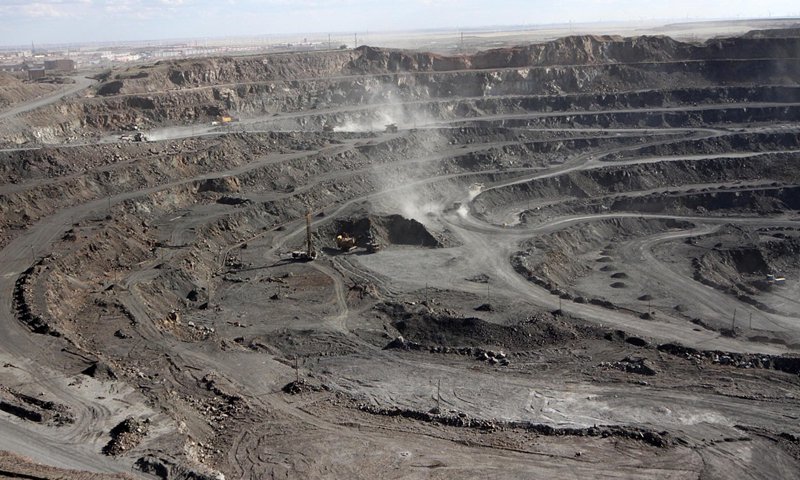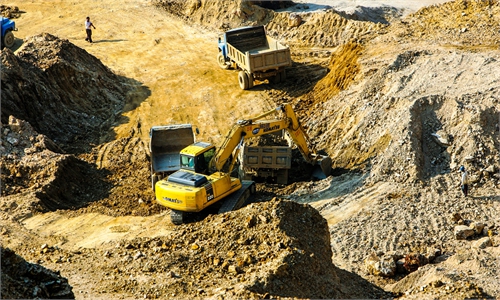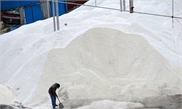Quad may pose some challenge to China-produced rare earths, but too costly and unsustainable: analysts

Mining of rare earths is conducted in Baiyunebo, North China's Inner Mongolia Autonomous Region on July 16, 2011. File photo: VCG
It may be logical for the Quad alliance, grouping the US, Japan, Australia and India, to team up to counter China in the rare-earth sector, given the dominant role the country plays in supplying more than half of the world's such key materials, yet the lack of relevant technologies and talent could obstruct their progress in building up a supply chain from scratch, which needs to take quite a few years to complete, industry observers told the Global Times.
The Quad nations planned to cooperate in funding new production technologies and development projects for rare earths, as well as lead the way in drafting international rules, according to a report by the Nikkei Asian Review.
Among the four nations, Australia and India are the suppliers while Japan and the US are big consumers of rare earths, dubbed "industrial gold" composed of a group of 17 chemical elements used in everything from high-tech consumer electronics to military equipment.
According to the US Geological Survey, China accounted for 58 percent of rare-earth production worldwide in 2020, down from around 90 percent some four years ago as the US and Australia have gradually boosted their own production.
The US has united with Australia, home to the world's sixth-largest reserves of rare-earth minerals, over recent years to improve rare earths supply.
"It's more like a tone-setting meeting for the four nations to team up for rare earths as they have realized the need to secure supply, but there are uncertainties in the implementation period," Liu Enqiao, a senior energy analyst at Beijing-based Anbound Consulting, told the Global Times on Friday.
"Each nation has its own interests to prioritize. For Australia and India, if they only play the role of rare-earth exporters instead of considering the practical market interests, it would not be sustainable," Liu noted.
Since rare-earth minerals need to be processed after they are extracted from the ground, the refining process of which will create large amounts of radioactive waste and thus pollute the environment, developed countries usually transfer the capacity to emerging countries. Australian miner Lynas produces light rare earths at a plant in Malaysia.
"For countries like Malaysia, it has to consider the balance between environmental sacrifice and local economy pickup," said Liu.
It is impossible for the US to contain China through the Quad given the different demands, political and religious situations in the Indo-Pacific region, and it is impractical for the US to replicate the NATO model in Asia, experts said.
The tie-up of the Quad could pose some challenge to the near-monopolistic position that Chinese rare earths have long held on the world stage, but it is not possible to shake off their reliance on China's supply chain in a short period. In the next 10 years, China will still be an important supplier in this system, said Chen Zhanheng, deputy head of the Association of China Rare Earth Industry.
"China has invested substantially in improving its refining technology over the past years, forging a definite advantage in this regard. The West currently lacks the relevant talent pool and efficiency to compete with China, plus they face much higher costs to produce by themselves instead of importing," Chen told the Global Times on Friday.
China has no intention to use rare earths as a countermeasure against any country, which would only accelerate development of rare earths in other markets, said experts.
Concerns arise among Western countries over China's possible move to restrict exports of the strategic material following the release of a draft rare-earth management rule in January by the Ministry of Industry and Information Technology (MIIT).
The ministry refuted such speculation, saying the draft aims at standardizing the industry in line with long-term development and market demand. "Economic globalization is a major trend. We need to work together to meet resource, energy and product needs in the process of economic and market development. I think this is mainly about promoting healthier and more sustainable development, in view of our current problems," said MIIT Minister Xiao Yaqing.


